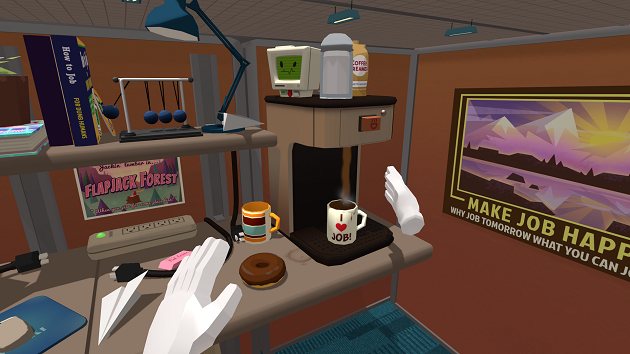Owlchemy Games broke some fascinating news this week. Virtual reality (VR) fans already knew that the developer’s debut VR title, Job Simulator, would be coming to the Oculus Rift and PlayStation VR head-mounted displays (HMDs) along with the HTC Vive for which it was first announced. But the developer has now revealed that it is implanting a dramatic new feature for all three versions of the title: 180 degree environments.
Let’s back up a bit here. So far what we’ve seen from Job Simulator are full 360 degree environments in which the player is free to mess around within seemingly mundane jobs as a means of passing time in the future. This version of the title makes full use of the position tracked controllers that complement each VR HMD, as well as Room Scale user tracking, in which players walk around an area that’s tracked by sensors and then have those movements replicated in-game. This feature is best seen in the HTC Vive, though it’s also said to be supported in the consumer version of the Oculus Rift.
Room Scale doesn’t feature in PlayStation VR, though, and not everyone with an Oculus Rift or HTC Vive will have the space to make full use of the feature. With that in mind, Owlchemy Labs is offering these new 180 degree environments that will give players better access to items without the need to navigate around the area as much. It’s an extensive solution to make the title accessible for everyone, and it highlights the issues with fragmentation that the VR industry could soon be facing.
Most VR developers understandably want to be everywhere. For some studios that’s going to be easy; seated experiences will translate to every HMD without any problems. But what about when developers that have been designing their experiences for Room Scale VR decide to port to PlayStation VR? Or what happens if they encounter problems with Oculus VR’s Room Scale offerings, of which there’s still much to learn about?
Take The Gallery, for example. Cloudhead Games’ upcoming episodic adventure title is looking to be an excellent showcase of the HTC Vive’s features, offering a fully user-tracked adventure on the platform. The developer is intending to bring the experience to the Oculus Rift too, which shouldn’t be a problem, but also PlayStation VR. Sony Computer Entertainment (SCE) itself has noted that it’s encouraging seated experiences for VR, so how does Cloudhead Games plan to offer the full experience on a HMD that doesn’t boast all of these features?
The answer may simply lie in controller support, especially considering that many are currently looking to PlayStation VR to be the cost-effective answer to high-end VR (though SCE is yet to confirm a price). It may be that, while PC-based titles offer the full experience, console players will largely have to settle for a DualShock 4 controller to walk through environments. It’s not the ideal solution, especially considering the PlayStation Move motion controllers don’t offer analogue sticks for their own easy navigation.
Valve itself talks about not wanting to force developers into making exclusives for the HTC Vive, but with its unique set of features it may well gather a healthy amount of titles that are only possible on its platform. That’s entirely dependent on Oculus VR of course, which is yet to really detail how studios can implement Room Scale in Oculus Rift titles. We don’t doubt the kit is capable of it, but why haven’t we seen anyone actually using it yet? Granted it won’t really become a factor until the launch of the Oculus Touch position tracked controllers in H2 2016. With The HTC Vive launching in April, then, the kit will be enjoying at least a two month window in which certain titles can only be experienced on its platform.
It’s an unfortunate truth that VR will be fragmented in its early days, but it remains to be seen just how much this will impact each HMD, especially PlayStation VR. With fans hoping to find an affordable entry point into the tech with SCE’s device, it may be that the lack of user tracking simply doesn’t matter. Purists, though, will no doubt find themselves frustrated at the limitations they’ll discover within the next few months.
-END-
The post VR vs. Fragmentation – Is PlayStation VR Set to Suffer? appeared first on VRFocus.










![Insta360 X4 Video Compilation [No Talking]: 8K, Slow-Mo, Timelapse](https://news.lecce360.com/wp-content/uploads/2024/04/1713362788_maxresdefault-218x150.jpg)





